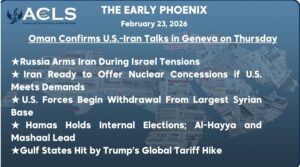★ IRAN
-
U.S.–Iran Nuclear Talks Show Progress While Military Tensions Simmer
The United States and Iran concluded indirect nuclear talks in Oman, with both sides describing the discussions as “constructive.” U.S. envoy Steve Witkoff offered a proposal omitting full dismantlement demands, focusing instead on sanctions relief and enrichment limits. Iran, under economic pressure, requested the release of frozen funds and opposed expanding the agenda to missiles or regional militias. The next round, scheduled for April 19 in Rome, will shift to direct dialogue. Despite diplomatic movement, Iranian Supreme Leader Khamenei ordered military readiness, and U.S. Defense Secretary Pete Hegseth warned of potential strikes if negotiations fail. Israeli officials criticized the U.S. for concessions that allow Iran to retain nuclear infrastructure, fearing Tehran’s proximity to weapons-grade capability. President Trump is set to decide on the path forward following these developments. The evolving talks present both opportunity and risk, as all sides brace for either breakthrough or confrontation.
============
★SYRIA
-
Syria’s Al-Sharaa Holds First Official UAE Visit For Talks
Syrian interim president Abu Mohammad Al-Jolani (Ahmed Al-Sharaa) met UAE President Mohammed bin Zayed in Abu Dhabi on his first UAE trip since January. Foreign Minister Abdullah bin Zayed received him, and the visit focused on strengthening bilateral ties. It marks Al-Jolani’s second Gulf trip after Saudi Arabia, amid efforts to rebuild Syria’s economy and ease Western sanctions.
-
Syrian Gravedigger Reveals Identity, Exposes Assad Regime Crimes
Mohammad Afif Naifeh, known as “The Gravedigger,” revealed his identity after years in hiding, detailing mass graves for torture victims of Bashar al-Assad’s regime. At Harvard, he described burying up to 600 bodies weekly from 2011 to 2018, many of them tortured children. His testimony, backed by Caesar’s leaked photos, helped document systematic killings and influenced international sanctions.
-
Armed Groups Across Syria Shift Toward Central Government Control
The Eighth Brigade, led by Ahmad Al-Awda, disbanded and surrendered its arms to Syria’s Defense Ministry, citing a commitment to unity and stability. This followed unrest in Busra al-Sham and aligned with Abu Mohammad Al-Jolani’s broader push to centralize armed forces. In northeast Syria, dozens of Arab fighters defected from the SDF to Damascus-held areas, mainly in protest against exclusionary policies. The SDF arrested commanders and launched investigations after rockets struck Mayadin. Meanwhile, in Suwayda, Druze leader Lieth Al-Balous pledged cooperation with the government, highlighting national integrity. However, top Druze cleric Hikmat Al-Hijri expressed reservations, citing existential risks.
============
★IRAQ
-
Muqtada Al-Sadr Urges Militia To Update Voter Records Despite Boycott
Despite announcing a boycott of Iraq’s November elections, Muqtada al-Sadr directed his militia, Saraya al-Salam, to update voter registration. The move follows Nouri al-Maliki’s reappointment as head of the rival Dawa Party. Al-Sadr warned that boycotting without updating records has no political effect, leaving rivals uncertain about his true electoral intentions.
-
Iraq Signs Deal For Offshore Pipeline Exporting 2.4 Million Barrels
Iraq signed a contract with Italy’s Micoperi and Turkey’s Esta to construct a strategic offshore oil pipeline from southern ports, designed to export 2.4 million barrels per day. The Oil Ministry said the project aims to enhance flexibility and stability in crude exports, though it did not specify the export destinations.
============
★YEMEN
-
Houthis Down U.S. Drone, Escalate Strikes on Israel and Face Intensified U.S. Air Campaign
The Houthi movement in Yemen escalated its confrontation with the United States and Israel, announcing the downing of a fourth American MQ-9 drone over Hajjah using a locally produced missile. The group also launched ballistic missiles—including a hypersonic one—targeting Israel’s Ben Gurion Airport and a military base, with explosions reported in Tel Aviv and Jerusalem. Israel confirmed intercepting a missile. Concurrently, the U.S. intensified its air campaign, launching 29 airstrikes in two hours across several provinces, including Sana’a, Marib, and Hodeidah, targeting Houthi weapons sites and training camps. Strikes on a ceramics factory in Sana’a killed six and injured 26. Houthis tightened media control in response, banning reports of their losses while promoting recruitment campaigns. A senior Houthi official warned any U.S. ground invasion would end in “hell and failure.” These developments reflect a deepening regional confrontation, as Houthis maintain attacks on Red Sea shipping and Israeli sites, and Washington escalates efforts to contain the threat.
-
Iran Orchestrates Houthi Expansion Threat Across Red Sea Region
Iran is intensifying its influence through the Houthis across Sudan, Eritrea, Djibouti, and Somalia, heightening threats to maritime security. A strategic report revealed that since 2001, Iran’s Revolutionary Guard has facilitated Houthi-linked arms smuggling and recruitment. In Sudan, Tehran revived arms networks; in Eritrea, trafficking uses isolated islands and camps; in Djibouti, smuggling persists with tacit local support; in Somalia, Houthis cooperate with pirates and extremists. Maritime forces from New Zealand and India recently intercepted $23 million in Iranian narcotics bound for Houthi fighters. Separately, U.S. President Donald Trump condemned the Houthis’ reach into Somalia and vowed stronger U.S. counterterrorism action. A UN report confirmed arms transfers from the Houthis to al-Shabaab, with documented drone training and piracy coordination, underscoring a destabilizing alliance threatening Gulf and East African waters.
============
★ ISRAEL
-
Bangladesh Restores ‘Except Israel’ Clause On Passports
Bangladesh reinstated the phrase “except Israel” on its passports, effectively banning travel to the country. The move reverses a 2021 decision under Prime Minister Sheikh Hasina’s government, which had removed the clause without altering Bangladesh’s pro-Palestine stance. The Interior Ministry issued new orders last week, aligning with mass protests in Dhaka condemning Israel’s actions in Gaza.
-
Israeli Airstrikes Kill Dozens, Destroy Gaza’s Last Hospital Facility
Israeli airstrikes on Sunday killed at least 38 Palestinians across Gaza, including six siblings aiding displaced families in Deir al-Balah. In Khan Younis, drone attacks struck refugee tents and the home of a police chief. Israel issued urgent evacuation orders in southern Khan Younis, directing civilians to Al-Mawasi shelters. On the same day, an Israeli airstrike destroyed Al-Ahli Arab Hospital—the last operational hospital in northern Gaza—hours after issuing an evacuation warning. The facility’s emergency services, oxygen supplies, and surgical units were obliterated, leaving hundreds without access to care. Though initial strikes caused no immediate casualties, one child reportedly died during evacuation. Israel claimed the hospital and nearby areas were Hamas command centers, an allegation local officials deny. Since resuming its offensive on March 18, Israeli strikes have killed 1,574 Palestinians, raising Gaza’s total death toll to 50,944. Global agencies condemned the targeting of medical infrastructure, warning such actions may constitute war crimes.
-
Hamas Fighters Ambush Troops As Israel Threatens Wider Offensive
Al-Qassam fighters ambushed Israeli forces in Rafah, killing and injuring soldiers, while Islamic Jihad launched rockets across Israel, triggering sirens in 300 towns, including Tel Aviv and Jerusalem. Israeli air defenses intercepted multiple projectiles, with debris reported in the West Bank. On Passover eve, a Gaza rocket was intercepted near southern Israel, prompting evacuations in Nuseirat and warnings of imminent strikes. Israel also destroyed a 1.2-kilometer tunnel in northern Gaza and uncovered weapons caches. Defense Minister Yisrael Katz warned of a harsher campaign if Hamas rejects hostage deal proposals, asserting that 10% of Gaza now lies within Israel’s buffer zone. Military Chief Lt. Gen. Eyal Zamir cautioned Netanyahu about troop shortages and warned that strategic goals in Gaza require a political framework, not just military force. Hamas remains active, with around 20,000 fighters and ongoing regrouping.
============
★ TÜRKIYE
-
Özgür Özel Vows to Oust Erdoğan, Renews Call for Elections
Turkey’s opposition leader Özgür Özel pledged to unseat President Erdoğan in the next election, launching nationwide rallies starting in Samsun. He demanded early elections and the release of Istanbul Mayor Ekrem İmamoğlu, whose revoked university degree spurred legal action and daily protests. Özel’s campaign has already gathered over 10 million signatures supporting both causes.
-
Türkiye, Iraq Boost Security Ties, Plan Joint Action Against PKK
Türkiye and Iraq concluded a high-level security meeting in Antalya, agreeing to deepen cooperation on military, counterterrorism, and infrastructure. Both sides emphasized joint action against the PKK, backed forming a joint operations center, and welcomed Iraqi PM al-Sudani’s upcoming May 8 visit to Türkiye to advance strategic cooperation.
-
Turkey Deploys Armed Unmanned Vehicles After Drone Success
Turkey’s security forces began operating two unmanned armored vehicles—tracked Fedai-1 and wheeled Fedai-2—developed by defense firm Best Group. Following drone success, Ankara is expanding unmanned platforms to land and sea. Both vehicles are remote-controlled, armed with 7.62mm weapons, and equipped with surveillance systems. Officials say they suit asymmetric warfare and reduce personnel risks.
============
★ LEBANON
-
Mohammed Al-Husseini was buried in a Beirut suburb after 14 years.
Mohammad Hassan Al-Husseini, the suicide bomber who killed five Israeli tourists in a 2012 Bulgaria bus attack, was buried Friday in Beirut’s southern suburb in a Hezbollah cemetery. His remains were repatriated with help from ex-security chief Abbas Ibrahim. Husseini, a dual French-Lebanese national, was identified via DNA. Bulgaria and Israel blame Hezbollah for the bombing.
-
Lebanon’s Prime Minister in Damascus to Discuss Detainees and Border Security
Prime Minister Nawaf Salam arrived in Damascus to address key files, including Lebanese detainees, border control, and refugee returns, aiming to update existing agreements and strengthen economic cooperation. His visit coincided with intensified security operations as the Lebanese army seized Captagon-making materials and arrested fugitives in Hermel, Baalbek, and Mount Lebanon. Weapons and narcotics were also confiscated. Separately, Beirut airport customs foiled an attempt to smuggle three kilograms of cocaine.
-
Hezbollah Retreats As Lebanon and Europe Escalate Disarmament Measures
Lebanon’s Deputy Prime Minister Tarek Mitri declared Hezbollah’s arms a major internal division, as the group ceded 190 of its 265 southern sites to the army under a ceasefire aligned with UN Resolution 1701. This marks a significant military retreat south of the Litani River. Lebanese officials, backed by U.S. disarmament conditions for aid, also demanded Israel’s withdrawal from disputed zones. Meanwhile, European agencies dismantled a Hezbollah-linked drone supply network stretching across four countries, accusing Lebanese operatives of building 1,000 UAVs for potential attacks. The dismantling of Hezbollah’s logistics and territorial hold signals a coordinated effort to restore Lebanese state control and regional stability.
============
★ THE GULF
-
Iran Holds Regional Talks With Gulf States During U.S. Negotiation Efforts
Iranian Foreign Minister Abbas Araghchi held phone talks with his Qatari, Kuwaiti, and Emirati counterparts on Sunday, discussing Gaza developments, U.S.-Iran negotiations, and regional stability. Qatar welcomed the recent U.S.-Iran talks in Oman, while the UAE and Kuwait emphasized cooperation and de-escalation. The calls reflect Tehran’s intensified diplomacy amid Gulf tensions and renewed international efforts for peace.
-
US and Saudi Arabia Advance Nuclear Deal Without Linking Israel Normalization
The U.S. and Saudi Arabia will sign a preliminary civil nuclear cooperation deal, U.S. Energy Secretary Chris Wright announced in Riyadh. While talks focus on developing Saudi Arabia’s nuclear industry under a potential Section 123 agreement, no mention was made of normalizing ties with Israel. Riyadh has resisted conditions restricting uranium enrichment and seeks smaller bilateral deals with Washington.
-
“Dragon Group” Chiefs Discuss Gaza, De-Escalation, and Maritime Security in Riyadh
Military chiefs from ”Dragon Group” states met in Riyadh on Sunday to address Gaza developments, regional de-escalation, and humanitarian aid delivery. Hosted by Saudi Arabia, the meeting included representatives from GCC countries, Egypt, Iraq, Jordan, the UK, and Northern Ireland. Discussions also focused on maritime security, counterterrorism, anti-smuggling, and piracy prevention amid ongoing regional tensions.
============
★ EGYPT&NORTH AFRICA
-
Hamas Delegation in Cairo Advances Ceasefire and Postwar Governance Deal
A Hamas delegation led by Khalil Al-Hayya held crucial talks in Cairo with Egyptian and Qatari mediators to finalize a phased ceasefire agreement. Discussions included Israel’s withdrawal, humanitarian aid access, and Gaza’s reconstruction. Egypt’s proposal also introduced plans for a postwar administration led by technocrats unaffiliated with Hamas to secure international recognition. Hamas agreed to release more hostages in two phases and provided updated information on the remaining captives. The deal’s momentum grew after the U.S. guaranteed that Israel would enter ceasefire talks if more than eight hostages were freed. Hamas responded to Israel’s offer to release 9–10 living hostages and return the remains of 10 others. The group reiterated that it will not disarm under any circumstances.
-
Egyptian President Begins Gulf Tour with High-Level Visit to Qatar
Egyptian President Abdel Fattah El-Sisi arrived in Doha Sunday, launching a Gulf tour. Qatari Emir Sheikh Tamim welcomed him at Hamad International Airport. The visit focused on strengthening bilateral cooperation, regional coordination, and Arab unity. Talks will cover Gaza ceasefire efforts, Palestinian developments, and economic partnerships. Sisi will next visit Kuwait for further high-level consultations.
-
Algeria Expels 12 French Embassy Staff Over Terror Case Fallout
Algeria ordered 12 French embassy staff to leave within 48 hours following the arrest of three Algerians in France linked to a terrorism plot. France condemned the expulsions and warned of immediate retaliation. The case involves the alleged April 2024 abduction of dissident Amira Boukhoris, for whom Algeria had issued nine international arrest warrants.
============




